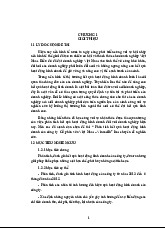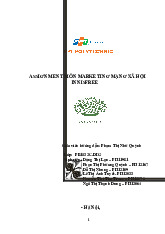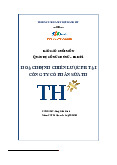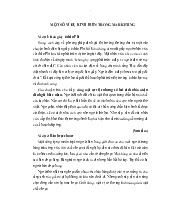


















Preview text:
ASSIGNMENT 1 FRONT SHEET Qualification
BTEC Level 4 HND Diploma in Business Unit number and title
Unit 5: Accounting Principles (5038) Submission date 26/6/2022
Date received (1st submission) 26/6/2022 Re-submission date
Date received (2nd submission) Student name Do Huyen Trang Student ID BH00323 Class BA0501 Assessor name Hoang My Linh Student declaration
I certify that the assignment submission is entirely my own work and I fully understand the consequences of plagiarism. I understand that
making a false declaration is a form of malpractice. Student’s signature: Grading grid P1 P2 M1 D1 Ư
Summative Feedbacks: Resubmission Feedbacks: Grade: Assessor Signature: Date:
Internal Verifier’s Comments: Signature & Date: Dear Valued Client
Our cordial welcome goes to you! Your presence is an absolute delight for us, and we are happy as
ever to serve you! Hope you like it here! First of all, let us introduce shortly about our company. It’s
a large accountancy firm that undertakes extensive business consultancy work for our client base.
We have a central London head office and regional offices in the UK in Birmingham and
Southampton and a small regional office in Vietnam. Nowadays, in any company, accounting is
considered as one of the most important departments. Practice has proven that when a business is
established, the first position to be recruited will be an accountant and even when the company is on
the verge of bankruptcy, laying off a series of employees, the accountant is also the last to "get" to
leave. We can see that accounting is really important in, any company or business needs an
accountant. As you know, accounting only collects, processes, checks, analyzes, recognizes
revenue,... but besides that it also supports superiors in risk, assessment, strategy,... That's why
today, we want to share and help you have a deeper knowledge about the role of accountants in
general and in an organization in particular.
So, what is the meaning accounting? Currently, there are many concepts of accounting, due to many
different approaches, there are many different definitions. One definition of accounting that has been
accepted throughout the years is the one presented in the "Report on Basic Accounting Theory"
issued by the American Accountants Association: “Accounting is the process of identifying,
measuring and communicating economic information to permit informed judgements and decisions
by users of the information." (Financial Accounting, 2022). It reveals profit or loss for a given
accounting period and the value of a firm's assets, liabilities and owners' equity. From there
providing financial information useful for making socio-economic decisions and evaluating the
effectiveness of business activities. Role of an accountant is doing functions related to the
collection, accuracy, recording, analysis, and presentation of a business, company or organization’s
financial operations. hat also holds a number of administrative functions in the company. Statutory
auditing, internal audit, taxation are some of the roles of accountant.
Who are the Users of Accounting Information? The users of managerial accounting information are
pretty easy to identify-basically, they’re a firm’s managers. We need to look a little more closely,
however, at the users of financial accounting information, and we also need to know a little more
about what they do with the information that accountants provide them. • Internal Users:
Owners and Managers: in summarizing the outcomes of a company’s financial activities over a
specified period of time, financial statements are, in effect, report cards for owners and managers.
They show, for example, whether the company did or didn’t make a profit and furnish other
information about the firm’s financial condition.
Investors and Creditors: if you loaned money to a friend to start a business, wouldn’t you want to
know how the business was doing? Investors and creditors furnish the money that a company needs
to operate, and not surprisingly, they feel the same way. Because they know that it’s impossible to
make smart investment and loan decisions without accurate reports on an organization’s financial
health, they study financial statements to assess a company’s performance and to make decisions about continued investment.
Governments: businesses are required to furnish financial information to a number of government
agencies. Publicly owned companies, for example—the ones whose shares are traded on a stock
exchange—must provide annual financial reports to the Securities and Exchange Commission
(SEC), a federal agency that regulates stock trades.
Suppliers: Just like lenders, suppliers need accounting information to assess the credit-worthiness
of its customers before offering goods and services on credit. • External Users:
Lenders: Lenders use accounting information of borrowers to assess their credit worthiness, i.e.
their ability to pay back any loan.
Governments: businesses are required to furnish financial information to a number of government
agencies. Publicly owned companies, for example-the ones whose shares are traded on a stock
exchange-must provide annual financial reports to the Securities and Exchange Commission (SEC),
a federal agency that regulates stock trades.
Customers: Most consumers don’t care about the financial information of its suppliers. Industrial
consumers however need accounting information about its suppliers in order to assess whether they
have the required resources that are necessary for a steady supply of goods or services in the future.
Community representatives: General public may also be interested in accounting information of a
company. These could include journalists, analysts, academics, activists and individuals with an
interest in economic developments.
Other users: a number of other external users have an interest in a company’s financial statements.
Suppliers, for example, need to know if the company to which they sell their goods is having trouble
paying its bills or may even be at risk of going under.
Just as there are many types of economic decisions, so there are many types of accounting
information. Financial Accounting, Management Accounting and Tax accounting often are
describing three types of accounting information that are widely used business decisions:
• Financial Accounting: records accounting
transactions and converts the resulting
information into financial statements.
• Cost and Management accounting: this is
process of identification, measurement,
accumulation, analysis, preparation,
interpretation and communication of
information used by management to plan, evaluate and control Others:
• Public Accounting: investigate the
financial statements and supporting
accounting systems of client companies
• Government Accounting: create and manage funds to pay for a number of expenditures
related to the provision of services by a government entity.
• Tax Accounting: ensures that complies with the applicable tax regulations, tax returns are
completed correctly and filed in a timely manner.
• Forensic Accounting: reconstruction of financial information when a complete set of
financial records is not available.
Accounting is an indispensable part of any company, organization or business. This is the part that
plays an important role in supporting the business in general and the financial performance of the
business in particular. Therefore, career opportunities in Accounting are also very diverse and highly stable.
Managerial: General accounting, Cost accounting, Budgeting, Internal auditing, Consulting,
Controller, Treasurer, Strategy,...
Financial: Preparation, Analysis, Auditing, Regulatory, Consulting, Planning, Criminal investigation,...
Taxation: Preparation, Planning, Regulatory, Investigations, Consulting, Enforcement, Legal services, Estate plans,..
Accounting-related: FBI investigators, Market researchers, Systems designers, Merger services,
Business valuation, Human services, Litigation support, Entrepreneurs,...
Accountant competencies are the technical skills and attributes that help professionals succeed in
accounting jobs and remain valuable to their businesses. These competencies can help accountants
complete their job responsibilities efficiently while maintaining accuracy.
Accountant competencies highlight to employers that an accountant possesses the skills to maintain
accurate financial records and interpret that information appropriately to provide quality advice. 10 accountant competencies:
There are many competencies accountants may possess that can contribute to a company's financial
success. Here are 10 highly valued competencies for accountants: 1. Research skills
Accountants often conduct research to understand economic conditions that may affect a company,
such as supply and demand. This research helps accountants gather information and clearly present
it to company leaders to help with their decision-making processes. Some research skills that can be
valuable for accountants include:
Data collection: This skill can help accountants gather information to answer client-specific questions.
Analysis: Accountants use analysis in their research to understand a concept more thoroughly.
Attention to detail: While researching, accountants may work with large volumes of data. They use
attention to detail to identify inconsistencies or discrepancies that can affect the results of their research. 2. Financial reporting
Financial reporting entails preparing statements to summarize a company's financial performance.
There are four types of statements that accountants often prepare to compile a financial report:
Balance sheet: This financial document defines a company's assets, liabilities and equity.
Income statement: This statement summarizes a company's revenue, expenses and profit margins.
Statement of equity changes: This report reveals the company's changes in equity over time.
Cash flow statement: This provides information on a company's cash movement, which includes the
business's profits and expenses. 3. Budgeting and forecasting
Budgeting determines a company's financial expectations over a short period, which companies
typically conduct annually. To compare figures from the start and conclusion of a fiscal year.
Forecasting helps companies predict their financial metrics based on historical data. Company
leaders often ask accountants to develop forecasting models that help them make short- and long- term financial decisions.
→ Both budgeting and forecasting are critical tools that help a business plan for future growth, and
understanding both concepts can help accountants guide companies effectively. 4. Spreadsheet proficiency
To collect, organize and analyze large amounts of data related to their business. Accountants often
use spreadsheet programs to perform mathematical calculations quickly and accurately. Common
spreadsheet skills that accountants often possess include:
Pivot tables: Accountants can use pivot tables to analyze a set of data from different perspectives.
Formulas: This can assist accountants in performing complex mathematical calculations quickly and effectively.
Charts: Which represent numerical information graphically. They can use these charts to
communicate key financial information in a simple and concise way. 5. Accuracy
This information can help businesses fulfill their tax requirements, make payments on time and
control cash flow effectively. To demonstrate accuracy in their work, accountants can complete
tasks in a timely manner, remain attentive when analyzing data and double-check their mathematical calculations frequently. 6. Time management
Some accounting firms may charge clients hourly, and accountants help create an accurate record of
the time they spend working on each account. Effective time management skills help accountants
meet their deadlines while balancing other priorities simultaneously. Some aspects of good time management include: • Organization • Prioritization • Planning • Delegation • Problem-solving 7. Business acumen
Business acumen is the understanding of how a business operates. While accounting is one
component of comprehensive business acumen, accountants can also benefit from understanding
other business concepts, such as marketing, human resources and operations. Help accountants
collaborate with managers or company executives to identify opportunities for growth and maximize
profits. Some skills that can help professionals develop business acumen include: • Strategic thinking • Technology skills • Negotiation • Team-building • Creativity 8. Mathematical skills
Many accounting responsibilities require formulas to calculate metrics and analyze data. While
many companies have software programs that can automate some of those processes, accountants
may still benefit from understanding calculations in case technology falters. Specific mathematical
skills that can be beneficial for accountants include: • Basic arithmetic • Statistics • Algebra • Mathematical modeling • Calculus 9. Communication
Accountants communicate with many individuals daily, such as clients, peers, managers,
stakeholders or financial institutions. Effective communication skills can help accountants explain
financial terminology and complex concepts to those whose of expertise lie outside of accounting.
Other communication skills that can benefit accountants include:
• Confident speaking voice and body language • Presentation skills
• Clear and concise language 10. Teamwork
Many accountants work as part of a team to accomplish the financial objectives of an organization.
They use teamwork skills to collaborate productively with others on common tasks or shared goals.
Accountants may work with their team to ensure accurate data, improve operational processes and
help business leaders make informed decisions. Accountants often use these teamwork skills: • Leadership • Collaboration • Listening • Empathy • Conflict resolution
There are common accounting skills that you will be expected to know how to utilize as a new
member of a public accounting firm or as a corporate accountant. Top Five Accounting Skills 1. Analytical
Accounting professionals must read, compare, and interpret figures and data. For example,
accountants might work to minimize a client’s tax liability by looking at their finances. Auditors
might analyze data to find instances of people misusing funds. Being able to analyze numbers and
figures in documents is a critical skill for all accounting jobs.
2. Communication/Interpersonal
Accountants have to be able to communicate with other departments, colleagues, and clients. They
might have to communicate in person, via email, or over the phone. Accountants also often have to
give presentations. Therefore, their written and oral communication must be strong. 3. Detail Oriented
A lot of accounting is about paying attention to the little details. Accounting professionals often
wade through a lot of data that they must analyze and interpret. This requires great attention to detail. 4. Information Technology
Accounting jobs often require knowledge of a variety of computer programs and systems. For
example, an accountant might need to use finance-related software systems (like QuickBooks), a
bookkeeper might need advanced Excel skills, or an auditor might need to know certain data modeling programs. 5. Organizational/Business
Organizational skills are important for accounting jobs. Accountants, bookkeepers, and others in the
accounting field must work with and manage a range of client’s documents. They need to be able to
keep these documents in order, and manage each client’s data.
What is an Accounting Information System (AIS)? It is a structured system where all the
information of an organization (business entity or non-profit organization) is collected, stored, and
managed in the form of data which is thereafter processed to prepare financial records of
importance. (Accounting As An Information System, 2022)
The accounting information system should have certain features that are common to all information
systems within a business. These are:
• Identifying and capturing relevant information.
• Recording, in a systematic way, the information collected.
• Analysing and interpreting the information collected.
• Reporting the information in a manner that suits user’s needs.
The relationship between these features is set out in Figure 1
Figure 1: The accounting information system
There are four sequential stages of an accounting information system. The first two stages are
concerned with preparation, whereas the last two stages are concerned with using the information collected.
The Role of Accounting Information System in an Organization:
Detailedents Analysis: In this, all end-users of the accounting information system are examined by
questions, to make sure that the system is fully understood, including the complete documentation collected.
System Design: After the detailed analysis, a new system is formed. The system is so designed that
it incorporates relevant internal controls to provide the management with the necessary information
to make important decisions for the organizations.
Documentation: While the system is being made, it is ensured that data is well documented. The
detailed documentation provides the users with accurate instructions regarding the new system.
Documentation plays an important role and is used for testing and training before rolling out the system.
Testing: The processes are tested before launching the system. The documentation collected ensures
the processes are well documented and procedures are followed. This phase is considered a “trial and
error” stage. At this stage, some system modifications can be done. Ensure that all processes are tested.
Training: All the staff is provided training to implement the changes as per the AIS software. Also,
at this stage staff can give better input to improve the system. Since they are only going to use it.
Data Conversion: In this stage, the existing data is transferred to the new system. Before converting
the data, it should be well tested and verified. And also, it is always advisable to have a data backup
at the time when it is needed to restart.
Rolling Out the New System: The entire company must know the date of the launch of the new
system. And this will be the ideal time for the organizations to switch over from one platform to the other.
Tools: The company should ensure that all possible online resources are made available to the staff
involved in using the new Account information system. The company should define the
responsibilities of each and every employee involved in this system. Requirem
Support: It should be ensured that the management and its end-users have on-going support available
at all times. Since the upper management depends on the AIS to meet the success goals of the
organization, system upgrades should be kept monitored at all costs.
→ In summary, the accounting information system has partly solved the three major problems of
today's private enterprises. Firstly, support and enhance the competitiveness of enterprises; the
second is to support decision making for businesses; finally, professional support, production and
business activities help businesses develop more and more prosperously.
Accounting is usually seen as having two distinct strands. These are:
• Management accounting, which seeks to meet the accounting needs of managers.
• Financial accounting, which seeks to meet the needs of the other users identified
The difference in their targeted user groups has led each strand of accounting to develop along
different lines. The main areas of difference are as follows:
Nature of the reports produced. Financial accounting reports tend to be general-purpose.
Although they are aimed primarily at providers of finance such as owners and lenders, they contain
financial information that will be useful for a broad range of users and decisions. Management
accounting reports, meanwhile, are often specific-purpose reports. They are designed with a
particular decision in mind and/or for a particular manager.
Level of detail. Financial accounting reports provide users with a broad overview of the
performance and position of the business for a period. As a result, information is aggregated (that is,
added together) and detail is often lost. Management accounting reports, however, often provide
managers with considerable detail to help them with a particular operational decision.
\\Regulations. The financial accounting reports of many businesses are subject to regulations
imposed by the law and by accounting rule makers. These regulations often require a standard
content and, perhaps, a standard format to be adopted. Management accounting reports, on the other
hand, are not subject to regulation and can be designed to meet the needs of particular managers.
Reporting interval. For most businesses, financial accounting reports are produced on an annual
basis, though some large businesses produce half-yearly reports and a few produce quarterly ones.
Management accounting reports will be produced as frequently as needed by managers. A sales
manager, for example, may need routine sales reports on a daily, weekly or monthly basis so as to
monitor performance closely. Special-purpose reports can also be prepared when the occasion
demands: for example, where an evaluation is required of a proposed investment in new equipment.
Time orientation. Financial accounting reports reveal the performance and position of a business
for the past period. In essence, they are backward-looking. Management accounting reports, on the
other hand, often provide information concerning future performance as well as past performance. It
is an oversimplification, however, to suggest that financial accounting reports never incorporate
expectations concerning the future. Occasionally, businesses will release forward-looking
information to other users in an attempt to raise finance or to fight off unwanted takeover bids. Even
the routine preparation of financial accounting reports for the past period typically requires making
some judgements about the future.
Range and quality of information. Two key points are worth mentioning. First, financial
accounting reports concentrate on information that can be quantified in monetary terms.
Management accounting also produces such reports, but is also more likely to produce reports that
contain information of a non-financial nature, such as physical volume of inventories, number of
sales orders received, number of new products launched, physical output per employee and so on.
Second, financial accounting places greater emphasis on the use of objective, verifiable evidence
when preparing reports. Management accounting reports may use information that is less objective
and verifiable, but neneverthelessrovide managers with the information they need.
→ We can see from this that management accounting is less constrained than financial accounting.
It may draw from a variety of sources and use information that has varying degrees of reliability.
The only real test to be applied when assessing the value of the information produced for managers
is whether or not it improves the quality of the decisions made.
The main differences between financial accounting and management accounting are summarised in figure 2:
Figure 2: Management and financial accounting compared
Although management and financial accounting are closely linked and have broadly common
objectives, there are a number of differences in emphasis. The differences between management
accounting and financial accounting suggest differences in the information needs of managers and
those of other users. While differenceses undoubtedly exist, there is also a good deal of overlap
between the information needs of both.
ƯTo some extent, differences between the two strands of accounting reflect differences in access to
financial information. Managers have much more control over the form and content of the
information that they receive. Other users have to rely on what managers are prepared to provide or
what financial reporting regulations insist must be provided. Although the scope of financial
accounting reports has increased over time, fears concerning loss of competitive advantage and user
ignorance about the reliability of forecast data have meant that other users do not receive the same
detailed and wide-ranging information as that available to managers.
The differences between IFRS and GAAP IFRS GAAP Local vs.
Is used in more than 110 countries around
Is only used in the United States. Global
the world, including the EU and many
Asian and South American countries Rules vs. Principles-based Rules-based Principles Inventory First In, First Out (FIFO) First In, First Out (FIFO) Methods Last In, First Out (LIFO) Inventory
Allow inventories to be written down to
Allow inventories to be written Write-Down
market value. If the market value later
down to market value. Reversal of Reversals
increases, IFRS allows the earlier write-
earlier write-downs is prohibited down to be reversed Fair Value
Allow revaluation of the following assets
Revaluation is prohibited except Revaluations
to fair value if fair value can be measured for marketable securities
reliably: inventories, property, plant &
equipment, intangible assets, and
investments in marketable securities Fixed Assets
Under IFRS, these same assets are GAAP requires that long-lived
initially valued at cost, but can later be
assets, such as buildings, furniture
revalued up or down to market value and equipment, be valued at historic cost and depreciated appropriately. Investment
Includes the distinct category of Has no such separate category Property investment property
• Allows lessees to exclude leases • Has no such exception Lease for low-valued assets • Excludes leases of all Accounting
• Includes leases for some kinds of intangible assets from the intangible assets scope of the lease accounting standard
The constraints and threats of IFRS and GAAP: IFRS:
• IFRS is less detailed than GAAP
• Implementation costs for small businesses: The transition to IFRS for these businesses far outweighs the benefits
• Capital markets and the standards are not the same in different countries GAAP: • Not being used globally
• GAAP tends to take a "one-size-fits-all" approach rather than accounting for the immense
diversity that is often seen between companies.
• Long wait times for new standards: GAAP policy boards go through rigorous deliberation
and an extensive process to set new standards for the generally accepted accounting principles
Principles as well as ethics in accounting Ethics in Accounting Ethics:
• Beliefs that distinguish right from wrong
• Accepted standards of good and bad behavior
Five fundamental principles of ethics in accounting: • Integrity • Objectivity
• Professional competence and due care • Confidentiality • Professional behaviour
Conceptual Framework Approach: Members shall identify, evaluate and address threats to
compliance with the rules and fundamental ethical principles.
Generally Accepted Accounting Principles (GAAP) from Financial Accounting Standard Board (FASB)
International Financial Reporting Standards (IFRS) from International Accounting Standard Board (IASB)
Vietnamese Accounting Standards (VAS) from Ministry of Finance Ư
Operating guidelines are classified as assumptions, principles, and constraints.
Assumptions provide a foundation for the accounting process.
Principles indicate how transactions and other economic events should be recorded.
Constraints on the accounting process allow for a relaxation of the principles under certain circumstances. Two constraints
• Materiality relates to an item’s impact on a firm’s overall financial condition and operations.
• Conservatism dictates that when in doubt, choose the method that will be the least likely to overstate assets and income.
In conclusion, accounting is an essential part of running a business, whether big or small.
Accounting is included in those fields that are growing faster in this era. It is dynamic at the present
time and meets the growing demands of trade, commerce and industry. It is appropriate to mention
here that the advent of industrial revolution and technological advancements have given rise to
widen more business prospects at the same time as bringing about change in the domain of
accounting by which it has now begun to be known as a tool of management for planning and
controlling process. Thus, it can be rightly said, in the present day and age, no economic activity
can be carried out successfully with no thought of accounting.
Thank you for taking the time to read our blog! Reference
Investopedia. 2022. Financial Accounting. [online] Available at:
ps://www.investopedia.com/terms/f/financialaccounting.asp> [Accessed 16 June 2022].
Publisher, A., 2022. 12.1 The Role of Accounting. [online] Open.lib.umn.edu. Available at: [Accessed 19 June 2022].
Accountancyknowledge.com. 2022. Types of Accounting - Financial Accounting - Management
Accounting. [online] Available at: [Accessed 16 June 2022].
Bragg, S., 2022. Types of accounting — AccountingTools. [online] AccountingTools. Available at:
//www.accountingtools.com/articles/what-are-the-types-of-accounting.html> [Accessed 16 June 2022].
vedantu.com. 2022. Accounting As An Information System. [online] Available at:
ps://www.vedantu.com/commerce/accounting-as-an-information-system> [Accessed 20 June 2022].
Indeed Career Guide. 2022. 10 Essential Accountant Competencies That Employers Seek. [online]
Available at: ps://www.indeed.com/career-advice/career-development/accountant-
competencies> [Accessed 23 June 2022].
The Balance Careers. 2022. List of Accounting Skills With Examples. [online] Available at:
//www.thebalancecareers.com/list-of-accounting-skills-
2062348#:~:text=Accountants%20must%20be%20detail%20oriented%2C%20have%20strong%20a
nalytical,definitely%20help%20you%20land%20and%20keep%20a%20job.> [Accessed 23 June 2022].
SIDDIQUI, F., 2022. Accounting- Need and Importance - Businessandfinance Blog. [online]
Businessandfinance.expertscolumn.com. Available at: [Accessed 24 June 2022].




